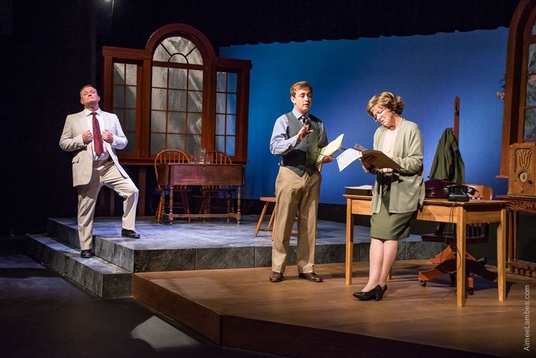Through Sun 9/30
Kenneth Jones, the author of Alabama Story, now on stage at Ensemble Theatre in its Ohio premiere, stated in an interview, “In May 2000, while reading the New York Times, I came across the story of Emily Wheelock Reed, the former State Librarian of Alabama who had been challenged by a segregationist state senator in 1959. Senator E.O. Eddins [of Demopolis, Alabama] demanded that a children’s picture book — Garth Williams’ The Rabbits’ Wedding, about a black rabbit marrying a white rabbit — be purged from the shelves of Alabama libraries on the grounds that it promoted race-mixing. Their conflict was reported worldwide. Before I finished reading the article, I knew this was an idea for a play.”
He went on to say about the play that resulted: “It’s a romance, a political thriller, a memory play, a workplace drama, a tearjerker, a comedy, a discussion about race, censorship and political desperation, and a rumination on the power of books. Most important, it’s a play about how we behave when we face terrible circumstances — how character is revealed in times of transition, change and crisis.”
He adds, “I hope that Alabama Story sparks a memory of a beloved book, the person who gave it to you and the day you realized that a turning of the page could be both terrifying and wonderful, and that — on some level, no matter what our differences — we all share the same story.”
The story takes place in still-segregated Montgomery, Alabama as the civil rights movement is in its early stages. A no-nonsense female head of the state library system makes book selections based on the National Library Association’s recommendations. A bigoted state senator, a true son of the south in political views and conservative religion, tries to impose his racist views upon all he touches. This includes the tomes on library shelves.
A parallel story evolves when two childhood friends meet by chance as adults, the same year as the library incident. She is the white daughter of a wealthy cotton plantation owner, and he is the son of her family’s long-time black cook. An incident between the girl and boy caused his mother and him to leave “the big house.”
Inspired by real events, Alabama Story touches on civil rights and censorship issues in the Deep South. Presently, in these days of rising bigotry fueled by the irrational tweets of an impulsive President, the play, which has been billed as “a humor-laced social-justice drama is a sort of vest-pocket cousin To Kill a Mockingbird, which also was the target of campaigns to rid it from libraries, has real implications.
Ensemble’s production, under the well-focused direction of Kenneth Jones, is riveting, compelling and emotionally eye-opening. The entire cast shines. Anne McEvoy portrays head librarian, Emily Reed, with conviction. This is a well-textured quality performance that presents a real person, speaking real language, in a totally believable way.
She is ably supported by Cody Kilpatrick Steele as Thomas, her assistant; Eugene Sumlin as Josh, the black man; Adrienne Jones as Lily, the white “rich” girl; and Craig Joseph in multiple roles. Though at times he overly postures thus creating a stereotype rather than a real person, Joseph Milan is properly pompous and hateful as Senator Higgins.
Walter Boswell’s set design, Ian Hinz’s lighting, and Tyler Whidden and Becca Moseley’s sound, all add to the production.
CAPSULE JUDGMENT: Alabama Story, a well-written account of a real-life incident is theater at its finest, displaying excellent acting, an enveloping script and a technically complementing design.
Alabama Story runs Thursdays through Sundays through 9/30. For tickets call 216-321-2930 or go online to ensembletheatrecle.org.
[Written by Roy Berko]
